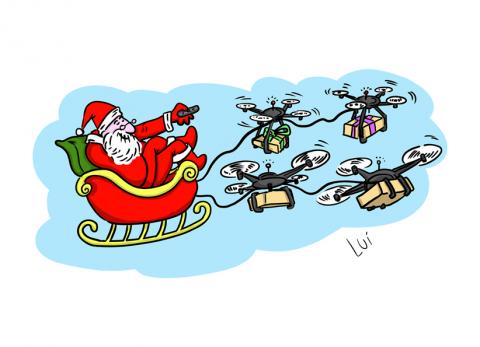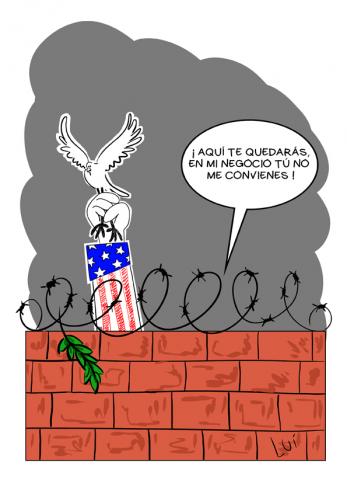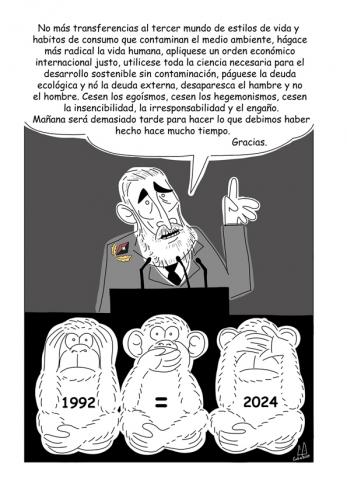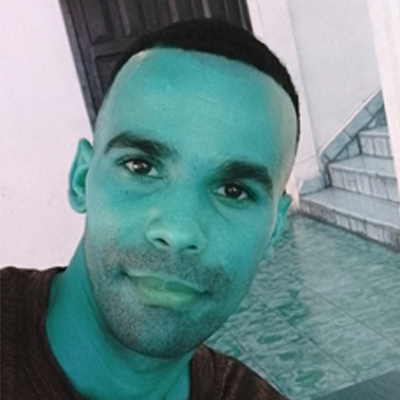Luis Enrique Pérez Hecaevarría es un joven humorista gráfico cubano. Sí, joven, pero en tan poco tiempo ha conseguido tener una excelente carrera.
Por ejemplo, ha participado en muchísimas exposiciones en Cuba, y también en Canadá. Colombia, Portugal, Montenegro, Kosovo, Egipto, Croacia, México, etc. Y ha recibido inumerables premios. También ha ilustrado libros en Cuba y México.
Sin dudas, todo parece indicar que esto es solo el prinicpio y su trabajo promete grandes éxitos más.
Es un placer tenerlo aquí en este vis a vis.
Aclaro que firma sus obras como “Lui”.
PP: Bueno, amigo mío, para los seguidores de Humor Sapiens, ¿puedes presentarte? (Porque quizás mi presentación fue incompleta). ¿Cómo te gustaría que te conocieran, que te recordaran?
LUI: Mi nombre es Luis Enrique Pérez Hechavarría, Artista Plástico, Caricaturista, Humorista gráfico e ilustrador. Tengo 35 años natural de Santiago de Cuba.
Quisiera que me recordaran como soy, un artista que a pesar de los tropiezos y las circunstancias sigue soñando con proyectos e ideas que marquen un antes y un después para la creación artística. Que mis colegas y las generaciones venideras me recuerden como un humorista gráfico que su mayor objetivo y meta fue, es y será llegar a cada uno de ellos con la intención de sacarle una risa o una gran carcajada.
PP: Muy bien, sin dudas, así será. Y para empezar a conocerte mejor, ¿en qué momento decidiste dedicarte al humor?
LUI: Era el año 2005 estudiaba en la Academia de Artes José Juaquín Tejada de mi ciudad natal, allí entre amigos contábamos historias y de alguna forma yo tomaba pluma y papel y comenzaba a dibujar caricaturas de todos allí presentes. Las carcajadas de mis compañeros, sus alegrías y la buena vibra que ahí se sentía me llevaron a la decisión de que esto era lo que yo quería, hacer humor gráfico y caricaturas.
PP: Perfecto. ¿Y empezaste a dibujar sin estilo? Supongo qure sí, como casi todo el mundo. Pero dime, si tuvieras uno, ¿qué estilo sería? ¿Tuviste alguna influencia de caricaturistas nacionales o extranjeros en ese momento? ¿Cómo ha evolucionado tu trabajo a lo largo del tiempo en términos de forma y contenido?
LUI: Pienso que uno nace con un estilo propio, pero luego comienzas los estudios de arte y la mayoría de los estudiantes son influenciados por sus maestros y otros por las tendencias de lo que ven de otros países. En mi caso que me gradué primeramente de Grabado fui muy influenciado por mi maestro Miguel Ángel Lobaina, Uno de los grandes maestros de la técnica de la colografía. Luego en el humor gráfico mis patrones eran Eduardo Abela y René de la Nuéz, con esos geniales personajes “El bobo” y “El loquito”, etc. que quedaron registrado para la historia del Humor Gráfico en Cuba y el mundo.
PP: Pues aquí mismo encontrarás una entrevista que le hice a Abela, el nieto y a Raúl de la Nuez, el hermano de René. Ah, a Raúl fueron dos, porque le hice otra solo sobre su hermano. Así que estarás aquí con ellos, y en el libro que saldrá este año. Espero que se guste. Y para continuar, ¿qué modo prefieres: dibujar con humor sin palabras o dibujar con textos? ¿Por qué?
LUI: Me gusta el humor de todas las formas posible siempre y cuando sea el humor sano, para mi lo importante es que el mensaje llegue, que te haga reír, soñar,
Pensar en fin que se disfrute de todas las formas posible.
PP: Entre los muchos premios que has recibido, ¿cuál te conmovió más o te impactó más?
LUI: Para mi todos, porque hasta una mención o una participación me da la muestra de que sigo vivo, de que estoy dando el alma y el corazón para hacer lo que siempre quise hacer que es hacer reír, divertirme y que otros disfruten con mi manera de hacer el humor gráfico.
PP: No me quisite decir por diplomacia, pero casi siempre hay un premio que deseabas más, o que llegó en el momentso que lo necesitas, etc. Pero vamos a otro punto: ¿cuál es el humor que más te gusta hacer? Te doy variantes:
a-El que simplemente te divierte | b-El que te divierte y te hace pensar | c-El que te hace pensar, pero sólo es crítico, satírico | d-El burlesco, irrespetuoso, ofensivo.
¿Y por qué no escogiste los otros? (si es que dejaste alguno sin escoger, claro)
LUI: Como dije anteriormente, toda forma de hacer humor me gusta, claro menos la irrespetuosa y ofensiva, por que no se trata de herir ni de menos preciar a nadie, ni de burlarse de manera grosera. Se trata de diversión, de que a pesar de como está el mundo pues de eso sacarle lo bueno, de pensar y de criticar de manera sana y con un lenguaje que llegue claro está, pero pasivo en todas las maneras posible.
PP: ¿El humorista nace o se hace?
LUI: El humorista pienso yo que nace, luego se va haciendo cada día más al irse desarrollando a través del tiempo, tomando referencias de otros artistas y trabajando a la par de como el mundo va evolucionando y de cómo puedes ser capaz de tener la chispa suficiente para que constantemente sigas generando el humor.
PP: Muchos piennsan como tú y muchos piensan que nace y se hace, de las dos maneras. Yo soy de ese grupo, aunque digo que los mejores son los que nacen y se hacen (y serán mejores que los que nacen y no se cultivan y que los que se cultivan, pero no nacieron con ese don de la comicidad. Aunque ambas maneras son necesarias, porque lo importante es reír y hacer reír). Y otro tema polémico: ¿es más fácil hacer llorar que hacer reír?
LUI: Creo que sí, es fácil provocar dolor, difícil es sacarle una sonrisa a alguien en medio de su dolor, y creo que los humoristas gráficos están llamados a eso, a hacer reír en medio de tanto dolor, guerras y desastres.
PP: Claro, pero también es difícil hacer reír a alguien que no esté en medio de un dolor. Por eso es tan necesario el humor siempre. Amigo mío, ¿y cuáles son los límites del humor, si los hubiera? A propósito, ¿fuiste censurado alguna vez? ¿Te autocensuras mucho, poco o nunca?
LUI: No nunca he sido censurado, gracias a Dios jjjjj, tampoco me autocensuro, soy libre de expresar lo que pienso, y el humor como ya dije si es sano en su máxima expresión no veo porque deba ser censurado.
PP: Pues te informo que hasta el humor más sano ha sido censurado, porque los censuradores son impredescibles. Y con la autocensura, no sé qué decirte, porque se me han ocurrido muchos chistes que no los he materializado, al pensar que quizás podría dañar a alguien. Y estoy a favor de la libertad de expresión sin ninguna excepción, pero puse en una balanza la satisfacción de hacer un buen chiste en un lado y en el otro que una persona se sintiera irrespetada y ganó no hacer el chiste. Eso es autocensura también. En fin, el tema da para mucho más. Dime ahora tu opinión: ¿cómo ves el presente y el futuro del humor gráfico? Tanto en Cuba como en el mundo.
LUI: Lo veo muy bien, mas vivo que nunca, mientras exista la creación de Dios que somos todos, habrá humor también, porque el humorismo respira y vive gracias a todo lo que sucede en el universo, bueno o malo de eso se alimenta y se desarrolla, cuando nada exista entonces el humor dejará de hacerse.
PP: Vaya, te pusiste bien profundo. Está bien. Pero algunos pensamos que actualmente “no está más vivo que nunca”. Y no es por escases de creadores, sino por causas externas como cierre de espacios en los medios, desapariciones de prensa plana, etc. y lo que queda es Internet y aún no se ha logrado resolver el pago. Y si no ganamos, nos morimos de hambre y se acaba el humor, ¿no? Ja, ja, no, es broma. En mi opinión estamos pasando una crisis, pero soy optimista, algo se inventará para que siga la vida, el amor y el humor. Oye, pero para darle un aire más ameno a este “vis a vis”, ¿podrías contarnos alguna anécdota cómica, curiosa o ingeniosa, que hayas vivido durante tu trayectoria en el humor?
LUI: Una anécdota de hace muy poco tiempo, pues ahora que solo se habla de inteligencia artificial. Me dice un colega: “Chico, ¿que opinas tú de la AI?”. Le respondí: “Mira, nosotros los humoristas gráficos somos pura AI, estamos tan preparados y entrenados y conocemos de lo que es noticia en el mundo entero, que mientras la inteligencia artificial está esperando que tú le ordenes qué hacer, nosotros cada un minuto estamos generando ideas nuevas y haciendo humor.
PP: De acuerdo. ¿Pero cuando llegue el momento en que la AI haga humor cada minuto? Aprovecho para un comercial: en este sitio Humor Sapiens, pueden buscar en el Menú, en la sección Humor Gráfico, específicamente en “Artículos” y verán un debate sobre humor e Inteligencia Artificial, donde participaron 55 colegas de 25 países, confrontando sus opiniones sobre el tema. Querido amigo, y para ir cerrando, ¿qué me puedes aconsejar a mí, como humorista?
LUI: Que sigas regalando al mundo tu manera de hacer humor y que nunca dejes de disfrutarlo.
PP: Muchas gracias, trataré de complacerte. Y por último, ¿le puedes dirigir unas palabras a los lectores de Humor Sapiens?
LUI: Mis queridos lectores de Humor Sapiens, sigan riendo a pesar de todo, no dejen que nada les borre la sonrisa, el mundo está lleno de odio, guerras y destrucciones, por eso disfruten al máximo y hagan que todo lo que está a su alrededor se diviertan con usted.
PP: Estarán felices nuestros lectores con ese consejo. Bueno, te vuelvo agradecer el tiempo y la atención que nos has dedicado. Te deseo mucha salud y muchísimos éxitos más, amigo mío.
Un abrazo.



Interview with Luis Enrique Pérez Hechavarría, "Lui"
by Pepe Pelayo
Luis Enrique Pérez Hechavarría is a young Cuban graphic humorist. Yes, young, but in such a short time, he has managed to build an excellent career.
For example, he has participated in numerous exhibitions in Cuba, as well as in Canada, Colombia, Portugal, Montenegro, Kosovo, Egypt, Croatia, Mexico, and more. He has also received countless awards and illustrated books in Cuba and Mexico.
Without a doubt, everything indicates that this is only the beginning, and his work promises even greater success.
It is a pleasure to have him here in this vis-à-vis.
I should mention that he signs his works as “Lui.”
PP: Well, my friend, for the followers of Humor Sapiens, can you introduce yourself? (Perhaps my introduction was incomplete.) How would you like to be known and remembered?
LUI: My name is Luis Enrique Pérez Hechavarría. I am a Visual Artist, Cartoonist, Graphic Humorist, and Illustrator. I am 35 years old and a native of Santiago de Cuba.
I would like to be remembered as I am: an artist who, despite setbacks and circumstances, continues dreaming of projects and ideas that mark a before and after in artistic creation. I hope my colleagues and future generations remember me as a graphic humorist whose greatest goal has always been, and will always be, to bring a smile or a hearty laugh to each of them.
PP: Very well, no doubt, that will be the case. To get to know you better, at what moment did you decide to dedicate yourself to humor?
LUI: It was around 2005 when I was studying at the José Joaquín Tejada Academy of Arts in my hometown. Among friends, we would tell stories, and at some point, I would grab a pen and paper and start drawing caricatures of everyone there. The laughter of my classmates, their joy, and the positive energy in that atmosphere led me to decide that this was what I wanted to do—graphic humor and caricatures.
PP: Perfect. And did you start drawing without a distinct style? I suppose so, like almost everyone. But tell me, if you had a specific style, what would it be? Did you have any influences from national or foreign cartoonists at that time? How has your work evolved over time in terms of form and content?
LUI: I think one is born with a personal style, but when you begin studying art, most students are influenced by their teachers or by trends from other countries. In my case, since I initially graduated in Printmaking, I was greatly influenced by my teacher Miguel Ángel Lobaina, one of the great masters of the collagraphy technique. Later, in graphic humor, my models were Eduardo Abela and René de la Nuez, with their brilliant characters El Bobo and El Loquito, which became part of the history of Graphic Humor in Cuba and the world.
PP: Right here, you’ll find an interview I did with Abela’s grandson and with Raúl de la Nuez, René’s brother. In fact, I did two interviews with Raúl—one specifically about his brother. So, you’ll be in good company here, and in the book that will be published this year. I hope you like it.
To continue, what style do you prefer: humor without words, or humor with text? Why?
LUI: I like all forms of humor as long as it is wholesome humor. For me, the most important thing is that the message gets through, that it makes people laugh, dream, and think—ultimately, that it can be enjoyed in every possible way.
PP: Among the many awards you have received, which one moved or impacted you the most?
LUI: To me, all of them are important, because even an honorable mention or just participating shows me that I am still alive, that I am putting my heart and soul into doing what I always wanted—to make people laugh, to enjoy myself, and to let others enjoy my way of creating graphic humor.
PP: You didn’t want to name one out of diplomacy, but there is usually an award that was most desired or that came at just the right moment. But let’s move on: what kind of humor do you most enjoy creating? Here are some options:
a) The kind that simply entertains you.
b) The kind that entertains you and makes you think.
c) The kind that makes you think, but is only critical or satirical.
d) The mocking, disrespectful, or offensive kind.
And why didn’t you choose the others (if you left any out, of course)?
LUI: As I said earlier, I enjoy all forms of humor—except the disrespectful and offensive kind. Humor should not hurt, belittle, or mock anyone in a crude way. It’s about having fun, about finding something good even in a world full of chaos, about making people think and criticize in a healthy way with clear but peaceful language.
PP: Is a humorist born or made?
LUI: I believe a humorist is born, but also develops over time, drawing from references, working alongside other artists, and evolving with the world while maintaining the spark needed to constantly generate humor.
PP: Many think like you, while others believe humorists are both born and made. I am in that group. But I also think the best ones are those who are born with it and cultivate it—better than those who are born with it but don’t develop it, and better than those who train themselves without an innate sense of comedy. Both paths are necessary, though, because the important thing is to laugh and to make others laugh.
Another controversial topic: is it easier to make people cry than to make them laugh?
LUI: I think so. It’s easy to provoke pain, but it’s difficult to bring a smile to someone who is in pain. And I believe graphic humorists are called to do just that—to make people laugh despite all the suffering, wars, and disasters.
PP: True, but it’s also hard to make someone laugh who isn’t suffering. That’s why humor is always necessary.
My friend, what are the limits of humor, if any? Have you ever been censored? Do you censor yourself a lot, a little, or not at all?
LUI: I’ve never been censored, thank God! (laughs) And I don’t self-censor either—I freely express what I think. And as I said, if humor is wholesome in its purest form, I don’t see why it should be censored.
PP: Just so you know, even the most wholesome humor has been censored, because censors are unpredictable.
Now, how do you see the present and future of graphic humor, both in Cuba and worldwide?
LUI: I see it as very much alive—more than ever! As long as humanity exists, humor will too. Humor breathes and thrives on everything that happens in the world, good or bad. When nothing exists, then humor will cease.
PP: You got quite deep there! But some of us think that humor isn’t "more alive than ever"—not because of a lack of creators, but due to external factors like media closures, the disappearance of print press, and so on.
Before we finish, can you share a funny or interesting anecdote from your career in humor?
LUI: A recent one—since everyone is talking about artificial intelligence (AI) now. A colleague asked me, “What do you think about AI?” I replied, “Look, we graphic humorists are pure AI. We’re so well-trained and knowledgeable about world news that while AI waits for you to tell it what to do, we’re generating new ideas and making humor every minute.”
PP: And what about when AI starts making humor every minute? (laughs)
One last thing—what advice would you give me as a humorist?
LUI: Keep sharing your humor with the world, and never stop enjoying it.
PP: Thank you! And finally, any words for Humor Sapiens readers?
LUI: My dear readers, keep laughing no matter what. Don’t let anything erase your smile. The world is full of hate, wars, and destruction, so enjoy life and make those around you laugh too.
PP: A great message! Thank you, my friend. Wishing you health and much success.
A big hug.
(Some texts have been translated into English by ChatGPT)

